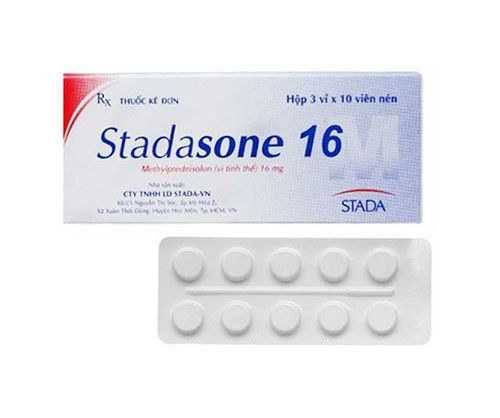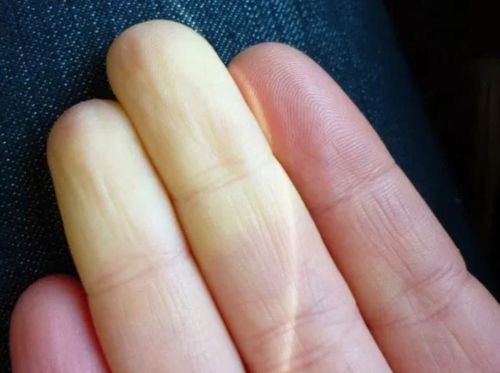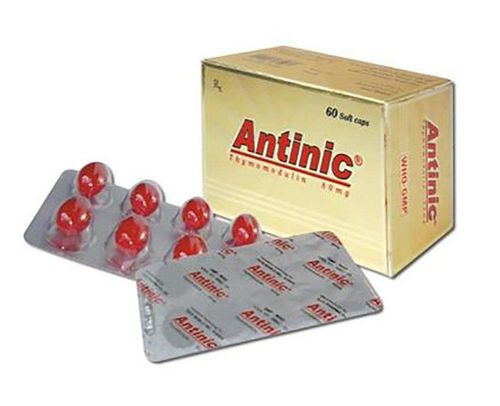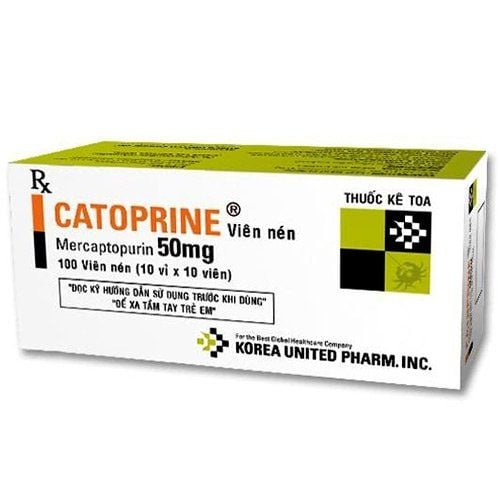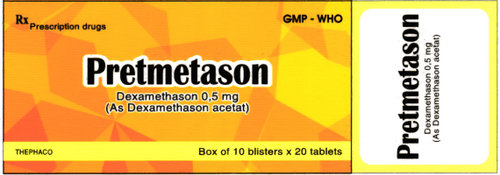This is an automatically translated article.
With nonspecific symptoms, the diagnosis of systemic scleroderma is often difficult. There is no cure for systemic sclerosis, but treatment will relieve symptoms and slow progression of the disease and prevent complications.
1. Diagnosis of systemic scleroderma
During a physical exam, the doctor will identify changes in the skin and compare it to the symptoms of the autoimmune disease scleroderma. The skin will be looked at under a microscope to examine the small blood vessels or capillaries around the nail.
Scleroderma develops gradually, has diverse manifestations and affects many different areas of the body. Some symptoms of the disease, such as GERD, shortness of breath, joint pain, and calcium deposits, are also common in people who don't have the disease. Therefore, it is difficult to make an accurate diagnosis of systemic scleroderma.
After a thorough physical exam, your doctor may recommend blood tests to check the levels of certain antibodies produced by the immune system, as well as rheumatoid factor and erythrocyte sedimentation rate.
In addition, the patient is also required to have functional tests of several organs, as well as imaging studies to determine if their digestive system, heart or lungs are affected. Other Scleroderma tests may include:
Chest X-ray; Urinalysis; CT scan of the lungs; Skin biopsy (the doctor takes a small sample of the affected person's skin to take to the laboratory for examination).

Xét nghiệm nước tiểu trong chẩn đoán xơ cứng bì toàn thân
2. Treatment of scleroderma
In some cases, scleroderma-related skin problems go away on their own after 2 - 5 years. However, the autoimmune disease scleroderma, if it affects internal organs, often worsens over time.
2.1. Medications There are no medications that can cure or stop the body from overproducing collagen, which is characteristic of scleroderma. But some medications will help control symptoms and prevent complications. For example, your doctor may recommend medication to:
Treat or slow skin changes: Creams or steroids can help reduce swelling and pain in joints, soften dry skin, and slow symptoms. develop on the skin; Dilates blood vessels: Medicines that increase blood flow to the fingers, or open the blood vessels in the lungs, prevent scarring. Blood pressure medications that dilate blood vessels also help prevent problems in the lungs and kidneys, as well as contribute to the treatment of Raynaud's syndrome; Immune system suppression: Medicines that suppress the immune system, such as methotrexate, Cytoxan, or organ transplant recipients, may help relieve some scleroderma symptoms; Relieves digestive symptoms: Medications that reduce stomach acid can control heartburn. Antibiotics and drugs that promote bowel movements will reduce bloating, diarrhea and constipation;
Prevent infections: Antibiotic ointments, which treat and prevent colds, help prevent infection with finger ulcers caused by Raynaud's syndrome. Regular flu and pneumonia vaccinations protect lungs already damaged by scleroderma; Pain relief: Nonsteroidal anti-inflammatory drugs (NSAIDs), such as ibuprofen or aspirin, help reduce swelling and pain. If over-the-counter pain relievers aren't enough to control severe symptoms, you can ask your doctor to prescribe stronger medication.

Thuốc chống viêm không steroid (NSAID) được sử dụng trong điều trị bệnh
2.2. Alternative Therapies Physical Therapy: A physical therapist can help you manage pain, improve strength and mobility, and maintain daily tasks while living together. with disease; Light therapy: Helps treat skin problems, such as A1 ultraviolet rays and lasers. 2.3. Surgery Used as a treatment of last resort for scleroderma, surgery is intended to manage complications of the disease, eg:
Amputation: If a finger ulcer due to Raynaud's disease is severe, has progressed grows to the point where finger tissue begins to die, amputation may be necessary; Lung or other organ transplant: When the patient's lungs (or other organs) have encountered serious problems, greatly affecting life function;
3. Home Remedies
You can refer to some of the following tips to manage the symptoms of autoimmune scleroderma at home, namely:
Stay active: Regular exercise will keep the body flexible, Improve blood circulation and reduce hardening. Proper physical therapy exercises can help keep skin and joints supple and soft. At the same time should add more fiber and fluids to the diet; Protect your skin: Take good care of dry, rough skin by using lotion and sunscreen regularly. Avoid hot showers and exposure to strong soaps, as well as household chemicals, which can irritate and dry the skin; Don't smoke: The nicotine in cigarettes causes blood vessels to constrict, making Raynaud's disease worse. Smoking can also permanently narrow blood vessels and worsen lung problems. If you can't quit smoking on your own, you can ask your doctor for help; Heartburn control: Avoid foods that make you feel heartburn or burping. Don't eat late at night. Elevate your pillow to keep stomach acid from backing up into your esophagus while you sleep. Taking antacids can also help relieve symptoms;

Người bệnh cần hạn chế việc ăn khuya giúp kiểm soát chứng ợ nóng
Keep warm: Always wear socks and gloves to protect your extremities whenever you feel cold - even in contact with the freezer. When outdoors in low temperatures, cover your face and head and wear layers of clothing to keep warm.
4. Tips for living with the disease
Like other chronic diseases, living with the autoimmune disease scleroderma can affect a patient's life, both physically and mentally. Here are some suggestions to help you overcome and live with the illness, so:
Maintain as normal daily activities as possible; Slow down and take the necessary rest; Stay connected with friends and family; Continuing to pursue hobbies and passions is still within the realm of possibility. Remember that mental and physical health can directly impact each other. Disagreement, anger and disappointment... are common negative emotions experienced by people with chronic illnesses in general.
Sometimes you will need professionals, such as a therapist or a psychologist, to deal with chronic illness and negative emotions. They will help you develop useful skills, including relaxation techniques.
You can also join a group of people with similar illnesses, which allows you to share your experiences and feelings with other patients like you.

Hãy đến cơ sở y tế và nhờ sự giúp đỡ từ bác sĩ khi bạn cần sự giúp đỡ từ các chuyên gia
In general, there is no cure for scleroderma, and there are no medications that can prevent it. However, symptoms can be controlled, preventing the disease from getting worse, helping to reduce the risk of complications and maintain bodily functions. Some cases of localized autoimmune scleroderma clear up on their own after several years. Scientists are still searching for an accurate method of diagnosing systemic scleroderma, as well as an effective treatment.
To register for examination and treatment at Vinmec International General Hospital, you can contact the nationwide Vinmec Health System Hotline, or register online HERE.
Reference source: Webmd.com; healthline.com, medicalnewstoday.com; mayoclinic




